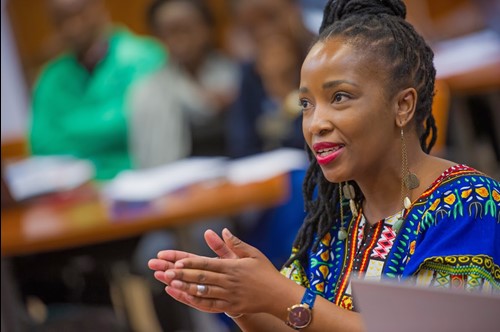YALI!

“On Third Mainland Bridge, driving in the rain, I see people offering to sell me gala—[which are] like, sausage rolls—on the street of Lagos,” she says in the interview. “It’s raining. The bridge is like 30 minutes long by driving … and you see these guys walking from the edge of the bridge to the other in the rain, in the sun. Sometimes I feel like crying because I say how do these guys survive every day? There is hunger in people to actually earn a living. They don’t have a job. So we just have to structure the old business model around entrepreneurship to say that is the next future for Africa.”
A part-time entrepreneur, Kuku holds a full-time job as a finance coordinator for British American Tobacco Nigeria. In her free time, she runs a business that helps young artisans from rural areas sell their work. She and the other 24 fellows from 17 countries see entrepreneurship, not industrialization or big business, as the key to transforming Africa.
With this in mind, the YALI fellows dove into lessons about business and entrepreneurship from Mendoza business professors and industry experts, exploring such topics as developing leadership skills for social change, funding new ventures, understanding markets, nonprofit management and dealing with corruption. They tasted life off campus through field trips to businesses in South Bend, Indianapolis and Chicago and community service projects on weekends.
Marc Hardy, director of nonprofit executive programs at Mendoza, organized Mendoza’s program. “In reviewing applications, I noticed two recurring concerns: unemployment/underemployment and corruption,” Hardy says. “These problems are leading young Africans to create their own businesses. Our fellows believe in Africa and they believe the way to raise the standard of living is through business and entrepreneurship.”
With YALI training up to 4,500 fellows during its 5-year lifespan (the number of participants is increasing to 1,000 in 2016. the potential for a multiplication effect across Africa is great, Hardy adds. “I think they are going to be the generation that ignites change for Africa,” he says. “Our fellows went from thinking they could make a difference to thinking they could
inspire a generation. To be clear, this program was not about them getting a job, it’s about these young leaders creating opportunities for others.”
Bill Brennan, senior associate for Mendoza, mentored the fellows individually. “I saw a common theme of Ask More of Business™ with them,” he says, mentioning the Mendoza tagline. “Many of them started businesses to tackle education, health care and other issues that are important to developing their countries,” he says. “Their vision was powerful and it was touching to be around them. You want to root for them and help them succeed.”
Especially when their business efforts are going to improve their communities, as is the case with Chingonzo and his current startup. Saisai, which means “wave” or “signal” in Zimbabwe’s Shona language, will offer free Internet access to people riding commuter buses in the country’s busiest cities. “Zimbabwe has one of the highest mobile data charges in the world,” he explains.

Comments